|
|
|
Sort Order |
|
|
|
Items / Page
|
|
|
|
|
|
|
| Srl | Item |
| 1 |
ID:
085337
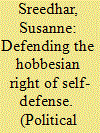

|
|
|
|
|
| Publication |
2008.
|
| Summary/Abstract |
A well-known part of Hobbes's political theory is his discussion of the inalienability of the right of self-defense. In this article, I present and defend a reinterpretation of Hobbes's account of self-defense. I begin by showing the weaknesses of the standard interpretation of this account: It rests on an implausible thesis about the evil of death; it renders Hobbes's applications of the right of self-defense inexplicable; and it conflicts with Hobbes's claim that there are cases in which the right of self-defense can be given up. I argue that we should understand Hobbes's claim to be that the right of self-defense is inalienable only in the social contract, and I offer a new interpretation of how his argument on this point might go.
|
|
|
|
|
|
|
|
|
|
|
|
|
|
|
|
| 2 |
ID:
123071
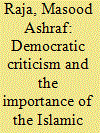

|
|
|
|
|
| Publication |
2013.
|
| Summary/Abstract |
Relying on major debates in reception and reader response theory, this essay attempts to explore the possibilities of reading metropolitan texts about Islam and Islamic culture with an understanding of the Islamic modes of meaning-making and interpretation. Geared toward scholars and students of literature and culture, the essay hopes to foster a more nuanced and complex approach to reading texts that appropriate Islamic raw materials in order to represent a mostly Western poetics and politics.
|
|
|
|
|
|
|
|
|
|
|
|
|
|
|
|
| 3 |
ID:
085339
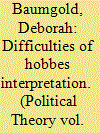

|
|
|
|
|
| Publication |
2008.
|
| Summary/Abstract |
Idiosyncrasies of Hobbes's composition process, together with a paucity of reliable autobiographical materials and the norms of seventeenth-century manuscript production, render interpretation of his political theory particularly difficult and contentious. These difficulties are surveyed here under three headings: (1) the process of "serial" composition (meaning the production of multiple, often expanded, versions of a work), which was common in the period; (2) the relationship between Hobbes's three political-theory texts- the Elements of Law, De Cive, and Leviathan, which is basic to defining the textual embodiment of his theory, and controversial; and (3) his method of writing. I argue that Hobbes's composition process undercut his intention to produce a deductive, logical theory of politics and opened the door to inconsistency and muddle in his arguments.
|
|
|
|
|
|
|
|
|
|
|
|
|
|
|
|
| 4 |
ID:
163447
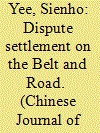

|
|
|
|
|
| Summary/Abstract |
This comment offers some brief observations on ideas that may promote the settlement of disputes that may arise from the Belt and Road Initiative, such as a possible standing investment court, a unified appellate mechanism or a legal aid mechanism as system components, a “lawyer for the situation” spirit for lawyering, an emphasis on a friendly style of dispute settlement, and a style of directly providing for rules of interpretation as part of the applicable law
|
|
|
|
|
|
|
|
|
|
|
|
|
|
|
|
| 5 |
ID:
140873
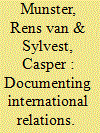

|
|
|
|
|
| Summary/Abstract |
International Relations (IR) is taking a stronger interest in visual practices and representations both as popular imaginaries that shape how we understand and act in the world and as vehicles for teaching empirical events and abstract concepts. The genre of documentary film has, however, received virtually no attention, which is striking given the last decade's explosion of widely circulated documentaries revolving around questions of central importance to IR. In this article we argue that IR needs to take documentary film-making seriously as a separate and significant medium of representation that—moving smoothly between fact and fiction, education and entertainment—directly intervenes in international politics by laying claim to (parts of) truth and reality. To this end, we introduce an analytical framework based on the idea of arrangements of perceptibility, a term that refers to the creative arrangement of sensorial perceptions (saying and showing) in documentary film. We distinguish between three such arrangements, each characterized by a specific theoretical modality (reality, truth, doubt), educational model (instruction, facilitation, problematization), and political efficacy (exposition, disclosure, destabilization). This framework enables a critical analysis of the politics of documentary film, which we demonstrate through a reading of recent documentary films about global politics
|
|
|
|
|
|
|
|
|
|
|
|
|
|
|
|
| 6 |
ID:
190063
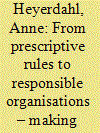

|
|
|
|
|
| Summary/Abstract |
Protective security management aims at protecting against malicious acts. It has, in a relatively short period, undergone substantial changes. One such change is the introduction of risk management. This article investigates a debate about a standard for security risk assessment (SRA) in Norway. It focuses on sense-making by security professionals, drawing on a unique interview material. The analysis utilises Michael Power’s theory on risk governance, as well as insights from security studies. A central finding is that the SRA approach was introduced to create more analytical security management. The importance of analysing one’s values (assets) makes it key to scrutinise the organisation’s characteristics, goals and vulnerabilities, regarded as moving security management in the direction of corporate governance. The article investigates how understanding of risk assessment and security interplay, and identifies a tension between risk (assessment) and the goal of protection, which makes security management risk averse. A requirement of creating sound security is viewed as a potential for burdensome organisational responsibility and blame. The analysis identifies elements of what is often described as resilience (attention towards vulnerabilities), but without the political reading (neo-liberal abdication of the state), thus contributing to the literature on resilience.
|
|
|
|
|
|
|
|
|
|
|
|
|
|
|
|
| 7 |
ID:
161047
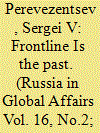

|
|
|
|
|
| Summary/Abstract |
This article studies several methods of assessing historical reality—“interpretation,” “mythologization,” “falsification,” and “folk history”—and describes all four of them. Based on this classification, the author analyzes the historical substantiation of nation-building in the modern Ukrainian state. The facts and theories used in this article convincingly prove that, unfortunately, by rejecting the data provided by Ukrainian and world science, Ukrainian politicians are building “a single Ukrainian nation” mainly by falsifying history and even using folk history. Such historical policy dramatically whips up political, ethnic, and religious tensions in the country and has negative consequences for the Ukrainian state.
|
|
|
|
|
|
|
|
|
|
|
|
|
|
|
|
| 8 |
ID:
157107
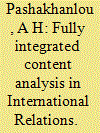

|
|
|
|
|
| Summary/Abstract |
Content analysis has once again come to the forefront of discussions regarding methods in International Relations (IR). The first wave of content analysis in IR lasted from the 1940s to the 1960s and was marked by a commitment to quantitative and manual analyses. The second wave of content analysis appeared at the start of the third millennium and continues to pervade the discipline. As with the first wave, it proceeds in a predominantly quantitative manner but emphasizes computer-assisted analysis rather than manual analysis. Critics and advocates of the method alike have, highlighted numerous shortcomings with these approaches. In order to address these limitations, the present investigation argues for a fully integrated content analysis that has the potential to ameliorate the identified weaknesses that have hitherto plagued the method. It accomplishes this task by combining all facets of the method: quantitative, qualitative, manual, and computer-assisted content analyses within a single research project.
|
|
|
|
|
|
|
|
|
|
|
|
|
|
|
|
| 9 |
ID:
127878
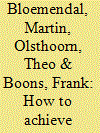

|
|
|
|
|
| Publication |
2014.
|
| Summary/Abstract |
A heat pump combined with Aquifer Thermal Energy Storage (ATES) has high potential in efficiently and sustainably providing thermal energy for space heating and cooling. This makes the subsurface, including its groundwater, of crucial importance for primary energy savings. The regulation of ATES systems is similar in many countries around the world. This paper seeks solutions for the institutional hindrances to the diffusion of ATES. The use of aquifers by individual ATES systems can be optimized to maximize their efficiency on the one hand, and to optimize the performance of the regional subsurface for energy storage on the other. The application of ATES in an aquifer has similar properties as other common resource pool problems. Only with detailed information and feedback about the actual subsurface status, a network of ATES systems can work towards an optimum for both the subsurface and buildings, instead of striving for a local optimum for individual buildings. Future governance of the subsurface may include the self-organization or self-governance. For that the ATES systems need a complementary framework; interpretation of interaction, feedback and adaptable and dynamic control interpretations are the key elements for the optimal and sustainable use of the subsurface.
|
|
|
|
|
|
|
|
|
|
|
|
|
|
|
|
| 10 |
ID:
157723
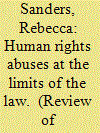

|
|
|
|
|
| Summary/Abstract |
Law following and law breaking are often conceptualised as polar opposites. However, authorities in liberal democracies increasingly deploy a strategy of what I call plausible legality in order to secure immunity and legitimacy for proscribed practices. Rather than ignore or suspend law, they construct legal justifications for human rights abuses and other dubious policies, obscuring the distinction between legal compliance and non-compliance. I argue this is possible because instabilities in legal rules make them vulnerable to manipulation and exploitation. By tracing American rationales for contentious ‘enhanced interrogation techniques’, indefinite detention, and ‘targeted killing’ practices in the ‘Global War on Terror’, I show that law need not always be abandoned or radically reconstituted to achieve troubling ends and that rule structures enable certain patterns of violation while limiting others. The international prohibition on torture is robust and universal, but provides vague definitions open to interpretation. Detention and lethal targeting regulations are jurisdictionally layered and contextually complex, creating loopholes and gaps. The article concludes by reflecting on implications for the protection of human rights. While law is not wholly indeterminate, human rights advocates must constantly advocate shared legal understandings that constrain state violence.
|
|
|
|
|
|
|
|
|
|
|
|
|
|
|
|
| 11 |
ID:
101736
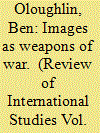

|
|
|
|
|
| Publication |
2011.
|
| Summary/Abstract |
Belief that images have become the critical 'weapon' in contemporary warfare has enjoyed great currency in the past decade. This belief rests upon certain understandings about the impact visual footage of terrorist attacks or still images of the abuse of prisoners have had on public opinion in different parts of the world. These understandings, in turn, reflect simplistic models of representation and mediation in which citizens are assumed to know little of the 'true' situation of war but are easily and primarily shocked by unexpected graphic images. To explore these relationships, this article presents analysis of original research from a three-year study of military practitioners, media coverage of security events, and collaborative audience ethnography across towns and cities in the UK. While military practitioners feel frustration that communicating with publics is 'like talking to a brick wall', analysis of audience interpretations of Abu Ghraib and other events suggests varied and negotiated understandings in which audiences account for processes of mediation as well as reflect on the event being represented. Images cannot necessarily be considered primary to explaining how an individual interprets a news story, and, to the extent and manner in which images do matter, this often depends on what longer historical narratives such images are situated within - by media or audiences themselves. No image is intrinsically shocking. For policymakers concerned with public diplomacy, for journalists and for audiences themselves there is a need for further research into the role images - Weber's 'visual language' - play amid today's conditions of diffused war.
|
|
|
|
|
|
|
|
|
|
|
|
|
|
|
|
| 12 |
ID:
073984


|
|
|
|
|
| Publication |
2006.
|
| Summary/Abstract |
This article examines the interpretation of rules as an essential part of their meaning. It starts with some of the most foundational rules - pacta sunt servanda, for instance - and points to their contested nature. It looks at some of the causes of this inherent contestability and its effects on the international system. It concludes by noting that appeals to rules never settle a debate, but only begin the interpretative process that constitutes the international system. While this interpretative licence does not lead to complete anarchy, it does leave open a wide range of outcomes in rule-governed systems.
|
|
|
|
|
|
|
|
|
|
|
|
|
|
|
|
| 13 |
ID:
132523
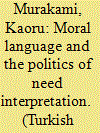

|
|
|
|
|
| Publication |
2014.
|
| Summary/Abstract |
Liberal modernists have claimed that democracy requires participation by interested parties in the politics of need interpretation. Poor people, an interested party, may lack the rational and critical language essential for the process of interpretation. This paper discusses a different perspective on the language of participation by the poor. Focusing on the everyday practices of the poor and using information collected from ethnographic research in Sultanbeyli, a low-income district in Istanbul, Turkey, it is shown how discursive power constrains the language and the manner of talking that the poor use to articulate their needs. The people in the district, "former villagers bound to the Anatolian tradition" using religious morality as a justification of their demands, successfully negotiate with administrators of social assistance programs, thus participating directly in the politics of need interpretation.
|
|
|
|
|
|
|
|
|
|
|
|
|
|
|
|
| 14 |
ID:
144359
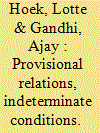

|
|
|
|
|
| Summary/Abstract |
In the introduction to this special section, we present six ethnographic articles that explore the sites and forms of ‘non-sociological sociality’ in South Asia. Set in urban spaces where the familiar vectors of relations, such as ethnicity, class, gender or age, may be attenuated, the articles examine how social and political entanglement is suffused with ambiguity, indeterminacy, provisionality and contingency. In these sites, opaque conditions, open-ended play, double meanings and interpretive scrutiny abound. Spaces such as the racecourse, the bazaar, the university campus or the nocturnal street suggest undetermined conditions and fleeting collaborations which have a wider bearing on cross-cutting forms of sociality in South Asia.
|
|
|
|
|
|
|
|
|
|
|
|
|
|
|
|
| 15 |
ID:
135246
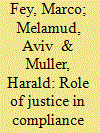

|
|
|
|
|
| Summary/Abstract |
Compliance is a central concept in both the study and practice of international relations, and the body of literature is correspondingly extensive. Although justice has already been shown to play an important role in international negotiations, its potential impact on actors’ compliance behavior has not been sufficiently explored to date. We examine the relationship between the two concepts, and posit that actors’ perceived justice considerations with a regime influence their compliance behavior. To illustrate the importance of including justice considerations in the study of compliance, we investigate Germany’s behavior as a member of the Nuclear Non-Proliferation Treaty during the 1960–80s. The empirical illustration exemplifies how a member’s justice contentions, borne of an unjust regime, can lead to contested compliance and regime conflict. The case illuminates the need to broaden our understanding of compliance and its complexity in both conceptual and practical terms.
|
|
|
|
|
|
|
|
|
|
|
|
|
|
|
|
| 16 |
ID:
140843
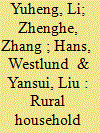

|
|
|
|
|
| Summary/Abstract |
This article aims to investigate the evidence of spatio-temporal disparity in rural household income at the provincial level in China during the 1978–2007 period. A research framework is developed to study the transitional processes of decentralisation, marketisation, urbanisation and globalisation. By computing the Moran’s I index and using the spatial regression model, the findings indicate a highly clustered, spatio-temporal disparity in rural household income across the eastern, central and western regions in China during the post-reform era. Rural household income tends to be higher in the eastern provinces in comparison to inland provinces. This disparity is attributed to the impacts from the institutional, economic, social and external transitions that become increasingly significant in the recent decades in China.
|
|
|
|
|
|
|
|
|
|
|
|
|
|
|
|
| 17 |
ID:
102644
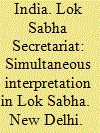

|
|
|
|
|
| Publication |
New Delhi, Lok Sabha Secretariat, 2009.
|
| Description |
6p.
|
| Series |
Parliamentary procedure abstract series; 38
|
|
|
|
|
|
|
|
|
|
|
|
Copies: C:1/I:0,R:1,Q:0
Circulation
| Accession# | Call# | Current Location | Status | Policy | Location |
| 055721 | 328.404/IND 055721 | Main | On Shelf | Reference books | |
|
|
|
|
| 18 |
ID:
131413


|
|
|
|
|
| Publication |
2014.
|
| Summary/Abstract |
Arnold J. Toynbee (1889-1975) has long been neglected or discounted by scholars of international relations and historians of international thought. Yet his contributions to International Affairs, as well as his Surveys of international affairs and his A study of history demonstrate both his capacity for acute interpretation of contemporary events and the depth of his learning about past international societies. This article examines his analysis of mid-twentieth century international relations, that 'Time of Troubles' which he believed would only be escaped through a recovery of 'creativity' and profound change in the ways in which world politics were practised. It explores the foundations of his approach to the field, demonstrated both in his Surveys of international affairs and his twelve volume magnum opus, A study of history, as well as his essays in journals. It analyses his diagnosis of the causes of our contemporary 'Time of Troubles', in the light of past episodes in world history Toynbee thought analogous to that present condition of international relations. And it traces his retreat from political solutions to the challenges faced in the twentieth century and his movement towards religious responses as a putative alternative. It concludes by arguing that Toynbee deserves recognition, not simply as a pioneering world historian or a controversial interpreter of the politics of the Middle East, but as an acute commentator on the international relations of a troubled age.
|
|
|
|
|
|
|
|
|
|
|
|
|
|
|
|
|
|
|
|
|